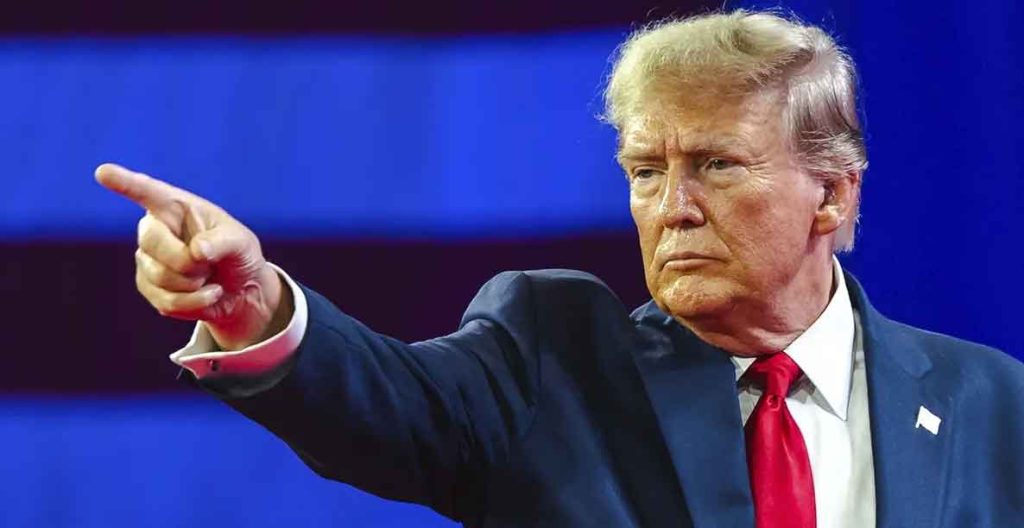Report: LGBTIQ people are particularly vulnerable to U.S. aid cuts
Trump policy also shuts down projects ranging from malaria prevention to landmine removal.

The Outright International advocacy organization issued this commentary and report on the effects of President Trump’s freeze on U.S. foreign aid:
Defunding Freedom – Impacts of U.S. Foreign Aid Cuts on LGBTIQ People Worldwide
“More than funding has been taken away from us. Hope, belief, and a chance to pursue happiness was snatched away.” – Activist from Trinidad and Tobago
Within the course of a week following President Donald Trump’s inauguration in January 2025, the United States government reversed a decade and a half of support for advancing the safety, equality, and inclusion of lesbian, gay, bisexual, transgender, intersex, and queer (LGBTIQ) people. On his first day in office, Trump claimed that trans and intersex people didn’t exist, erased non-discrimination provisions, and branded work with marginalized communities in the U.S. and abroad as un-American.
Four days later, on January 24, Trump issued a 90-day freeze on nearly all foreign assistance. Organizations around the world that received U.S. government funds for work with LGBTIQ communities began to receive stop-work orders instructing them to immediately halt all programmatic work and cease all expenditures on their grants. LGBTIQ organizations and their allies were forced, with no notice, to shut down programs, lay off staff, suspend crucial research and advocacy work, and turn away beneficiaries from services.
By February 7, some recipients of U.S. funds began to receive termination notices from the U.S. government, cutting off their U.S.-funded programming entirely. The foreign assistance freeze and the subsequent attempts to dismantle the U.S. Agency for International Development (USAID) have affected civil society groups and development efforts in all sectors.
U.S.-funded projects that were forced to grind to a halt ranged from building police stations to preventing malaria, from improving agricultural production to removing landmines.
While the impacts are being felt in every sector, there are at least two ways in which LGBTIQ people are particularly vulnerable. First, many of the LGBTIQ organizations that received support from USAID or the U.S. State Department are unable to fundraise locally, a result of criminalizing or discriminatory laws or entrenched societal stigma; unlike organizations in other sectors, few can expect their own governments or private donors in their countries to fill any portion of that gap. Second, LGBTIQ organizations are losing funding at precisely the moment that their communities are facing an upsurge in vitriol from unscrupulous politicians, increasing the risks of violence and exclusion.
Many LGBTIQ organizations operate on a shoestring, effecting life-saving development and human rights work with limited financial and human resources. Over the last 15 years, larger global and regional organizations have worked with both the US State Department and USAID to construct trusted networks that allow funds to be disseminated through intermediaries, including Outright International, to organizations that may lack the capacity to apply for and manage the large grants government agencies typically make available.
Outright — one of many such intermediaries — was forced to suspend 120 grants to organizations in 42 countries as a result of the aid freeze. These grants ranged from USD $9,000 to $180,000, reaching nascent grassroots organizations as well as organizations working nationally or regionally with decades of experience delivering services or advancing equality.
This rapid assessment presents a snapshot of how LGBTIQ organizations in every region of the world have been impacted by the US foreign assistance freeze. These organizations work to prevent homophobic and transphobic violence, protect LGBTIQ people from arbitrary detention and torture, provide healthcare services, propel legal reform, and develop income-generation opportunities for populations that are often relegated to the margins of society. For LGBTIQ people who may face state-sponsored violence and discrimination or widespread public rejection, these organizations are often the only source of institutional support.
This rapid assessment is intended for multiple audiences:
- Members of Congress and other policymakers in the United States, who must defend foreign assistance and stand as a bulwark against the Trump administration’s lawlessness and its targeting of marginalized communities.
- Other bilateral and multilateral development partners, who should step in to fill the gaps left by the foreign assistance freeze for crucial LGBTIQ human rights and inclusion work.
- Media outlets, which should eschew sensationalist clickbait and ensure evidence-based coverage of the harms that LGBTIQ people will experience due to the aid freeze.
- Advocates in the LGBTIQ movement and throughout other sectors, who should find common cause to defend inclusive democracy and development.
More than 80 years ago, then-U.S. President Franklin Delano Roosevelt articulated a vision for “four freedoms”: freedom of speech, freedom of worship, freedom from want, and freedom from fear. He argued that people everywhere in the world should benefit from these freedoms and that promoting them was both a moral imperative and in the US national security interest.
These “fundamental freedoms” have been adapted and adopted in the US and globally, echoing in frameworks like the Universal Declaration of Human Rights and informing the policy priorities of institutions such as USAID.
This briefing paper relies on a reconfiguration of the four freedoms as freedom from want, freedom from fear, freedom of speech and conscience, and freedom to live in dignity to articulate the multiple ways in which LGBTIQ communities around the globe have been impacted by the foreign assistance freeze and the initial phases of an apparent full-fledged US retreat from its decades-long global human rights leadership role.




